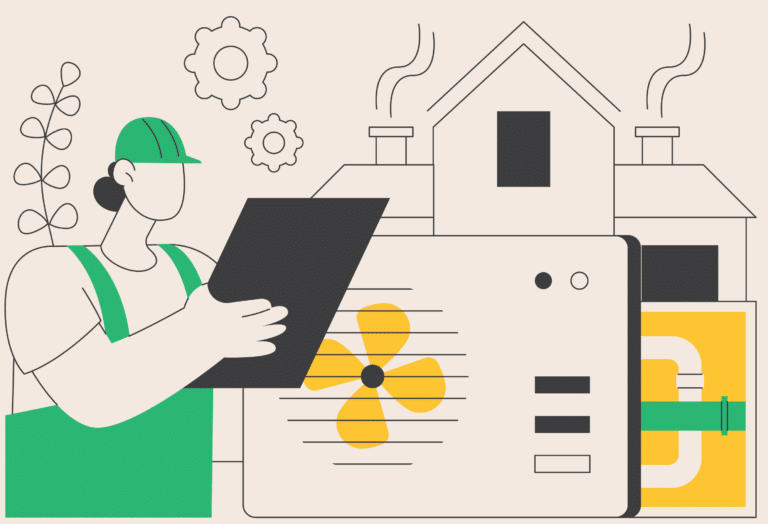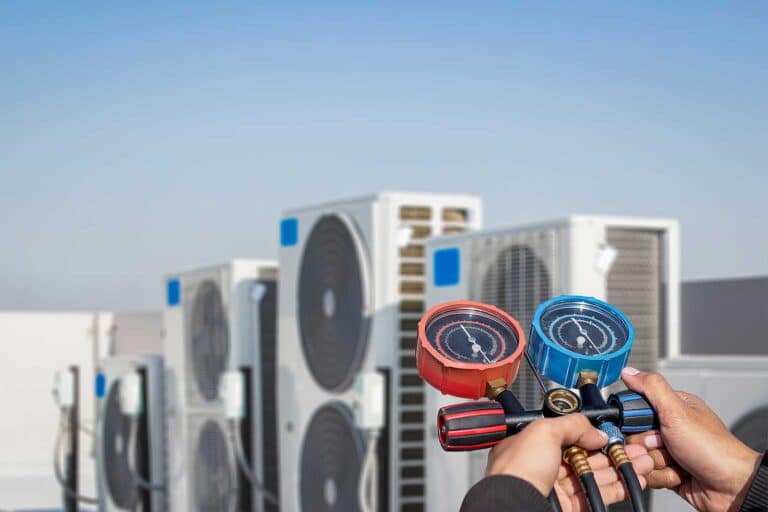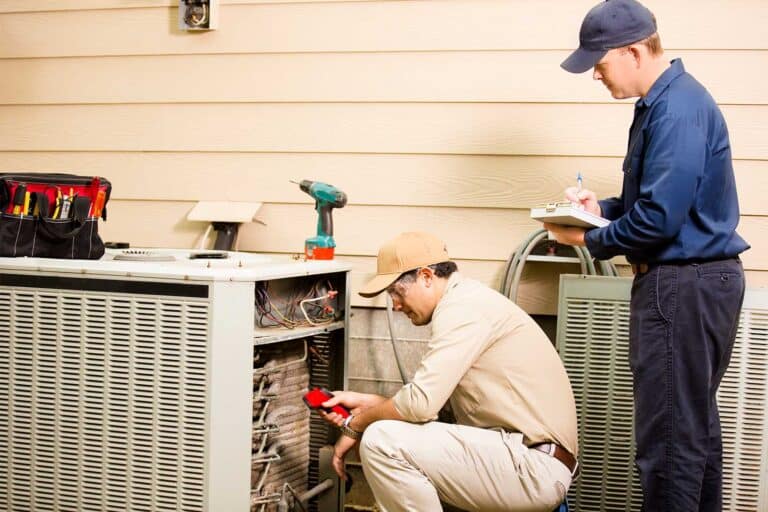Why does my AC smell bad? What to Do About It
If you’ve ever turned on your air conditioner only to be hit with a musty, sour, or burning odor—you’re not alone. Many Colorado homeowners search online asking, “Why does my AC smell bad?” And it’s a question worth answering.
An air conditioner that smells off isn’t just annoying—it could signal a deeper problem. Whether it’s mold, electrical issues, or a clogged drain, these odors can point to trouble that impacts your health, safety, and energy efficiency.
In this guide, we’ll break down the most common reasons your AC smells bad, how to fix each issue, and when to call the experts at Blue Valley Heating and Cooling.
Keynotes: Fixing an AC That Smells Bad
- 70% of bad AC smells come from neglect or skipped maintenance
- Regular air conditioning maintenance prevents most odor-causing issues
- Indoor air quality devices like air purifiers or UV lights can neutralize smells at the source
1. Musty or Moldy Smell
A musty odor is one of the most common complaints when an AC smells bad. It typically points to mold or mildew buildup inside your system.
Why it happens:
- Moisture trapped in ducts or drip pans
- Clogged condensate drain line
- Poor airflow or dirty air filters
What to do:
- Change your air filter
- Check the condensate line for blockages
- Schedule air conditioning maintenance to clean coils and pans
Mold spores don’t just smell—they can circulate through your home and affect indoor air quality.
2. Burning or Electrical Smell
If your AC smells bad like something is burning, shut it off immediately. This could indicate an electrical issue or overheating component.
Common causes:
- Worn-out motor or wiring
- Failing capacitor
- Dust burning off after long periods of inactivity
Next steps:
- Turn off the unit
- Avoid using the system until inspected
- Call for air conditioning repair to check the electrical components
Safety first—never ignore a burning odor.
3. Dirty Sock Smell
Yes, it’s a real thing. If your AC smells bad like sweaty gym socks, you’re likely dealing with bacteria growing on the evaporator coil.
Why it happens:
- Moisture + dust = bacterial growth
- Often occurs after long periods of system inactivity
How to fix it:
- Clean or replace the air filter
- Schedule professional coil cleaning
- Use a thermostat with humidity control or add a UV air purifier
This unpleasant smell is common in spring when homeowners first switch to cooling mode.
4. Rotten Egg or Sulfur Smell
If your AC smells bad like rotten eggs, this could signal a gas leak—especially in systems with natural gas heating.
Warning signs:
- Strong sulfur-like odor near vents or the outdoor unit
- Hissing sounds from the gas line
- Headaches or nausea indoors
What to do immediately:
- Turn off the system
- Leave your home and call the gas company
- Contact an HVAC technician once the area is cleared
Do not ignore this smell—it’s potentially dangerous.
5. Exhaust Fume Odor
While your AC doesn’t run on gasoline, it uses fluids that can emit fume-like odors when leaking or burning.
Causes:
- Refrigerant leak
- Oil residue on AC components
- Damaged insulation around motors or fans
Fix it by:
- Scheduling an inspection for leaks or faulty parts
- Replacing worn insulation
- Topping off or replacing refrigerant with EPA-certified service
If your AC smells bad like exhaust, act fast—refrigerant exposure is hazardous.
6. Dead Animal Smell
This is one of the more disturbing reasons your AC smells bad. Rodents or birds sometimes enter ductwork or the outdoor unit and get trapped.
What to look for:
- Persistent foul odor from one or two vents
- Noise in ductwork or outdoor unit
How to handle it:
- Turn off the system
- Call for a duct inspection and cleaning
- Consider pest-proofing your HVAC setup
Removing the animal and disinfecting the area is essential for safety and smell.
7. Chemical or Sweet Smell
If your AC smells bad with a sweet, chemical odor, it might be a refrigerant leak—especially if it’s a newer system using R-410A.
Signs:
- Cool air is weak
- High energy bills
- Ice on the coils
What to do:
- Don’t run the system
- Schedule an inspection with a certified technician
Refrigerant leaks not only affect performance—they’re an environmental concern.
Keynotes: What AC Odors Might Be Telling You
- Musty smells = mold, clogged drain, or dirty filter
- Burning smells = electrical hazard—turn it off!
- Rotten egg smell = possible gas leak—evacuate and call for help
- Dirty sock smell = bacteria on the coil
- Chemical odor = refrigerant leak
FAQs About Why Your AC Smells Bad
Why does my AC smell bad when I turn it on?
It’s usually from dust, bacteria, or mold burning off after a long period of inactivity. Cleaning your system or scheduling maintenance can help.
Can I fix a smelly AC myself?
Some things, like replacing the filter or clearing a drain line, you can do yourself. But electrical or refrigerant issues should always be handled by a pro.
How do I prevent my AC from smelling bad?
Regular inspections, coil cleaning, and air filter changes are key. Consider adding UV lights or air purification if odors return frequently.
What’s the most dangerous AC odor?
Rotten egg or sulfur smells can indicate a gas leak and should be treated as an emergency. Turn off the system and get to safety.
Is AC coil cleaning worth it?
Absolutely. Dirty coils are one of the main reasons your AC smells bad and can also hurt efficiency and performance.
If your AC smells bad, don’t wait for it to get worse. Blue Valley Heating and Cooling offers trusted AC repair, cleaning, and maintenance across Longmont, Erie, Boulder, and Centennial.
📞 Ready to schedule service?
Visit: https://bluevalleyheatingcooling.com/contact-us/







